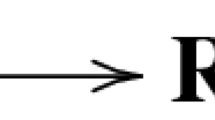Abstract
Let X be a zero-dimensional space and Y be a Tychonoff space. We show that every non-zero ring homomorphism \(\Phi :C(X,\mathbb {Z})\rightarrow C(Y)\) can be induced by a continuous function \(\pi :Y\rightarrow \upsilon _0X.\) Using this, it turns out that the kernel of such homomorphisms is equal to the intersection of some family of minimal prime ideals in \({{\mathrm{MinMax}}}\left( C(X,\mathbb {Z})\right) .\) As a consequence, we are able to obtain the fact that the factor ring \(\frac{C(X,\mathbb {Z})}{C_F(X,\mathbb {Z})}\) is a subring of some ring of continuous functions if and only if each infinite subset of isolated points of X has a limit point in \(\upsilon _0X.\) This implies that for an arbitrary infinite set X, the factor ring \(\frac{\prod _{_{x\in X}}\mathbb {Z}_{_{x}}}{\oplus _{_{x\in X}}\mathbb {Z}_{_{x}}}\) is not embedded in any ring of continuous functions. The classical ring of quotients of the factor ring \(\frac{C(X,\mathbb {Z})}{C_F(X,\mathbb {Z})}\) is fully characterized. Finally, it is shown that the factor ring \(\frac{C(X,\mathbb {Z})}{C_F(X,\mathbb {Z})}\) is an I-ring if and only if each infinite subset of isolated points on X has a limit point in \(\upsilon _0X\) and \(\upsilon _0X{\setminus }\mathbb {I}(X)\) is an extremally disconnected \(C_{\mathbb {Z}}\)-subspace of \(\upsilon _0X,\) where \(\mathbb {I}(X)\) is the set of all isolated points of X.
Similar content being viewed by others
References
Alling, N.L.: Rings of continuous integer-valued functions and nonstandard arithmetic. Trans. Am. Math. Soc. 118, 498–525 (1974)
Azarpanah, F.: Algebraic properties of some compact spaces. Real Anal. Exch. 25, 317–328 (2000)
Călugăreanu, G.: Lattice Concepts of Module Theory. Springer Science+Business Media, Dordrecht (2000)
Drees, K.M.: A Nagata-like theorem for certain function spaces. Algebra Universalis 62, 259–272 (2009)
Eggert, N.: Rings whose overrings are integrally closed. J. Reine Angew. Math. 282, 88–95 (1976)
Ellis, R.: Extending continuous functions on zero-dimensional spaces. Math. Ann. 186, 114–122 (1970)
Engelking, R., Mrówka, S.: On E-compact spaces. Bull. Acad. Pol. Sci. 6, 429–436 (1958)
Estaji, A.A., Karamzadeh, O.A.S.: On \(C(X)\) modulo its socle. Commun. Algebra 31, 1561–1571 (2003)
Finn, R.T., Martinez, J., McGovern, W.W.: Commutative singular \(f\)-rings. In: Holland, W.C., Martinez, J. (eds.) Ordered Algebraic Structures, pp. 149–166. Springer Science+Business Media B. V., Dordrecht (1997)
Ghadermazi, M., Karamzadeh, O.A.S., Namdari, M.: On the functionally countable subalgebra of \(C(X)\). Rend. Sem. Mat. Univ. Padova 129, 47–69 (2013)
Gillman, L., Jerison, M.: Rings of Continuous Functions. Springer, Dordrecht (1976)
Hager, A.W., Martinez, J.: Fraction-dense algebras and spaces. Acta Appl. Math. 27, 55–65 (1992)
Karamzadeh, O.A.S.: On a question of Matlis. Commun. Algebra 25, 2717–2726 (1997)
Karamzadeh, O.A.S., Rostami, M.: On the intrinsic topology and some related ideals of \(C(X)\). Proc. Am. Math. Soc. 93, 179–184 (1985)
Martinez, J.: \(C(X, \mathbb{Z}),\) revisited. Adv. Math. 99, 152–161 (1993)
Martinez, J.: The maximal ring of quotients of an \(f\)-ring. Algebra Universalis 33, 355–369 (1995)
McConnell, J.C., Robson, J.C.: Noncommutative Noetherian Rings. Wiley Interscience, New York (1987)
Mrówka, S.: Structures of continuous functions III. Rings and lattices of integer-valued continuous functions. Vehr. Ned. Akad. Wet. Sect. I 68, 74–82 (1965)
Pierce, R.S.: Rings of integer-valued continuous functions. Trans. Am. Math. Soc. 100, 371–394 (1961)
Porter, J.R., Woods, R.G.: Extensions and Absolutes of Hausdorff Spaces. Springer, New York (1988)
Sharp, R.Y.: Steps in Commutative Algebra, 2nd edn. Cambridge University Press, Cambridge (2000)
Subramanian, H.: Integer-valued continuous functions. Bull. Soc. Math. Fr. 95, 275–263 (1969)
Vechtomov, E.M.: Rings of continuous functions with values in a topological division ring. J. Math. Sci. 78, 702–753 (1996)
Author information
Authors and Affiliations
Corresponding author
Additional information
Dedicated to Professor Ronnie Levi.
Presented by W. Wm. McGovern.
Rights and permissions
About this article
Cite this article
Olfati, A.R. Homomorphisms from \(C(X,\mathbb {Z})\) into a ring of continuous functions. Algebra Univers. 79, 34 (2018). https://doi.org/10.1007/s00012-018-0509-9
Received:
Accepted:
Published:
DOI: https://doi.org/10.1007/s00012-018-0509-9



